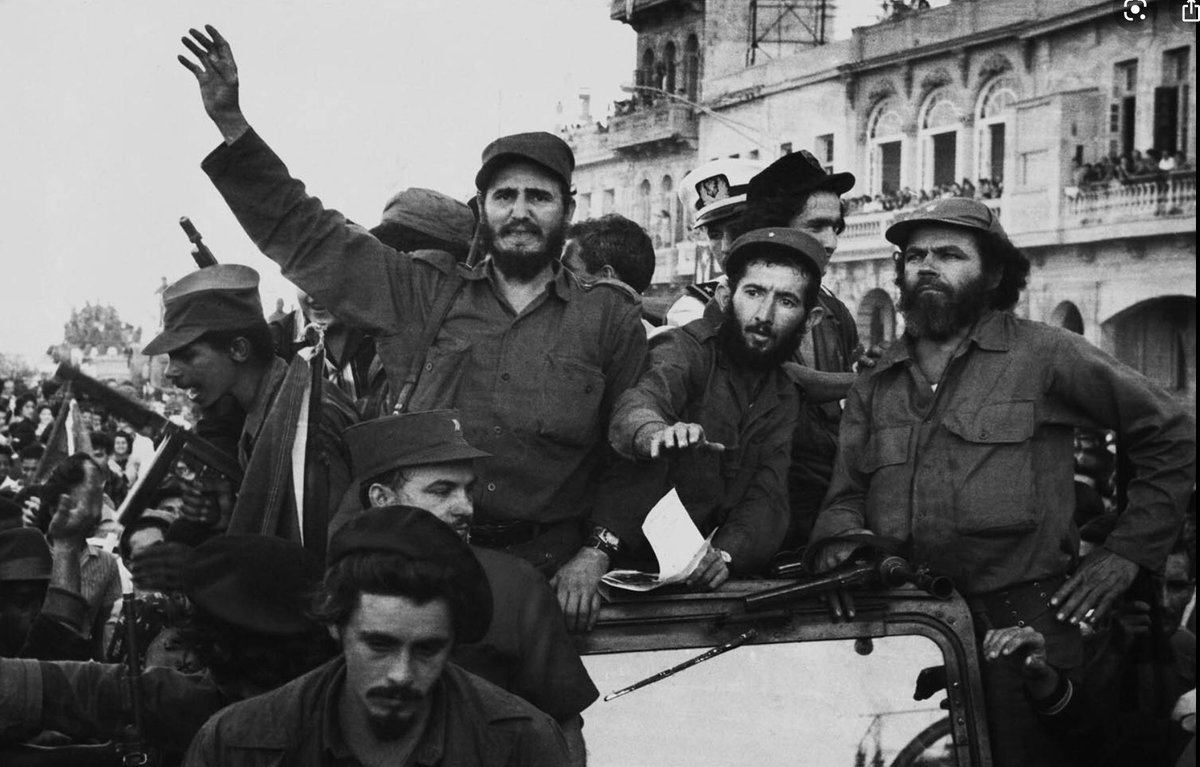
Fidel Castro enters Havana on 9th January, 1959. File photo.

Orinoco Tribune – News and opinion pieces about Venezuela and beyond
From Venezuela and made by Venezuelan Chavistas

Fidel Castro enters Havana on 9th January, 1959. File photo.
By Arnold August – Jul 21, 2022
The Macdonald-Laurier Institute (MLI) describes itself as “Canada’s only truly national public policy think tank based in Ottawa,” which is “rigorously independent and non-partisan…” In reality, it is a conservative think tank supported financially by like-minded governments (Latvia and Taiwan province), which The Canada Files has tracked since 2020.
Thus, it was no surprise that the MLI would publish an article on July 11, 2022 entitled “Canada should not be so tolerant of Cuba’s repressive regime,” by Michael Lima (“a researcher and director of Democratic Spaces, an NGO seeking solidarity in Canada with human rights defenders and civil society in Cuba) and Sarah Teich (an international human rights lawyer and a senior fellow at the Macdonald-Laurier Institute).”
To understand this article, a close analysis of the false narrative demonizing Cuba is required.
How does the MLI spread disinformation on Cuba?
The article starts with an historical analysis meant to justify or explain the current condemnation of Cuba by the two authors:
The Cuban people’s pursuit of freedom and democracy goes back to at least March 1952, when the country’s constitutional order broke down due to a military coup that ended nearly 12 years of constitutional government. Then when Fidel Castro seized power on January 1, 1959, he betrayed the ideals of his generation, ultimately prohibiting free elections altogether. He established a Soviet-style one-party dictatorship that differed drastically from the individual freedoms and checks and balances guaranteed in the 1940 Constitution—a constitution which his regime had initially promised to restore.
However, the first sentence leaves out a key component that explains the 1952 coup, which we will deal with this later after we delve into the rest of this paragraph.
“Betrayal”
The MLI authors write: “Then when Fidel Castro seized power on January 1, 1959, he betrayed the ideals of his generation, ultimately prohibiting free elections altogether.” Let us deal with “betrayal.” The MLI article takes a page from the US State Department’s and White House playbook against the Cuba Revolution, and this going back to 1960. How do we know this?
In the U.S. State Department Document 607, 1960, “Memorandum from the Secretary of Defense’s Deputy Assistant for Special Operations (Landsdale) to the Deputy Secretary of Defense (Douglas), Cuba. United States Government Printing Office (November 7), Vol. VI, Washington outlines its policy of “betrayal” for regime change in Cuba. It accused Fidel Castro of “betraying the original aims of the Revolution,” as if the US, any more than the MLI, could be familiar with the original aims, let alone sympathize with them.
The State Department “betrayal” narrative reveals itself even more in a second Memorandum (1961), in which it adorns itself with the image of social democracy and libertarianism. The goal is to guide dissidents or to lure others into this tendency. In the State Department’s own words, this social democratic inclination has been considered a viable alternative to the “Castro regime.” The US has been sympathetic to—and willing to provide funds to—this penchant: “Our job [i.e., that of the US] is to … show that the essential conflict in Cuba is nothing more or less than between the totalitarian (or communist) and the libertarian (or social democratic) wings of the Cuban Revolution.”[i] Those who were active in the revolution, but who turned against it and were later co-opted by the US, have been groomed as prized spokespersons of “betrayal” on behalf of Washington.[ii]
Furthermore, a formerly secret Memorandum from the President’s [JFK] Special Assistant (Schlesinger) to the Political Warfare Subcommittee of the Cuban Task Force, on May 31, 1962, states that the “CIA is prepared to disseminate leaflets on Castro’s failure to the Cuban population via balloon with a view of increasing instability of the Communist machine … for ‘the revolution’ he has now betrayed.”[iii] (emphasis added).”
The “betrayal” theme goes hand-in-hand with the use of the press in the US and internationally focusing on “liberals” and “liberal” media as allies. According to the US: “We should also make a particular effort to get the stories of Castro terrorism into the hands, not of the [rather ‘conservative’] New York Journal-American, but of liberal newspapers and columnists.” European media has also been a goal: “politicians, editors and opinion-makers.”[iv] Liberals, [declares the US] have been a prize catch, as they are more credible against Cuba and serve as an instrument to convert pro-Castro activities into anti-Castro ones.”[v] While the MLI is in contrast not liberal, but rather conservative, over 60 years later this think-tank plays on current “liberal” opposition to the Cuban government led by the Democrat Joe Biden. In this way, it is hoping to shame the Justin Trudeau government into fully embracing the US narrative.
Washington’s persistent attempt to use mass media brings into question the meaning of freedom of the press in the US, as well as the role of the “liberals.” Another US Memorandum, right after the 1959 revolution, on the same theme of “betrayal”, involved Operation Mongoose. This was a CIA-organized operation under President John F. Kennedy to overthrow the Cuban government after the failed US-backed Bay of Pigs invasion. In this Memorandum, the State Department even considered “Time magazine [‘liberal press’] dissemination [in Cuba, that] would require operational facilities now not available.”[vi]
Once again, it is instructive to ask who might have made the following statement: “Castro and his gang have betrayed the ideals of the Cuban revolution and the hopes of the Cuban people.” Did it emanate from a social democrat, a democratic “socialist” or another variety of left or right dissident? No, it was JFK speaking on October 6, 1960[vii] (emphasis added).
Another Memorandum dated July 19, 1962 (this one from an official of Operation Mongoose to another of its representatives) carries a list of actions carried out by an “inter-agency psychological warfare committee.” The very first one on the list is “the failures and betrayed promises of the Castro regime.”[viii]
My 2013 book Cuba and Its Neighbours: Democracy in Motion (Fernwood Publishing) deals with all the issues raised by the MLI in their introductory paragraph, including “betrayal.” The following extract from my publication provides further context and elaboration of the betrayal issue. Note how the innocent looking “betrayal” buzz word is directly linked to the origins of the 1960 US blockade against Cuba, whose overt purpose is the overthrow of the Fidel-led government. Furthermore, we can also read how the current dissidents in Cuba, who are now active in fomenting the July 11 protests with the goal of a color revolution, also get their cue from the Washington “betrayal” talking point. Thus, not surprising that we read that there is common ground between moderate dissidents and those who openly call for military invasion of Cuba.
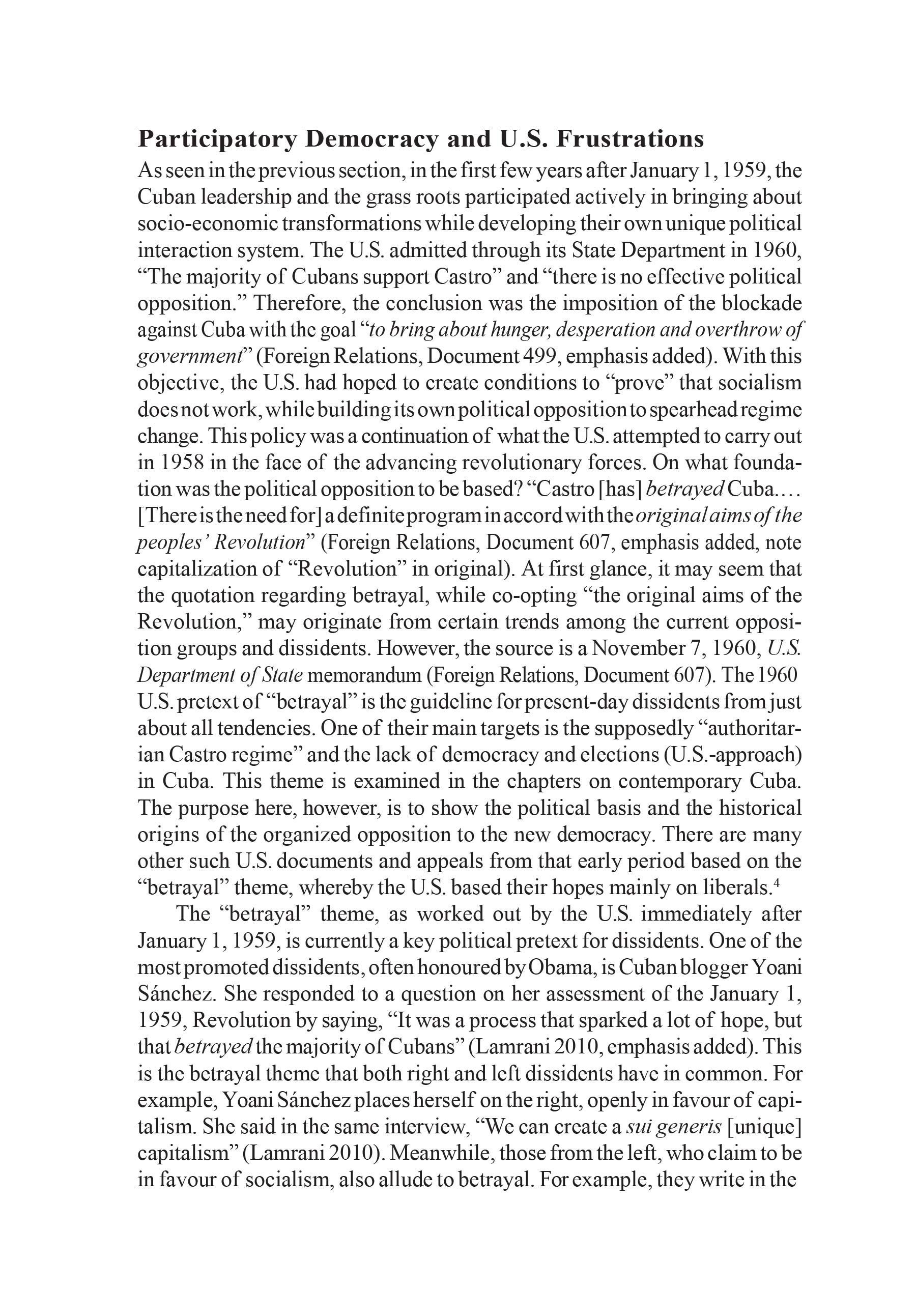
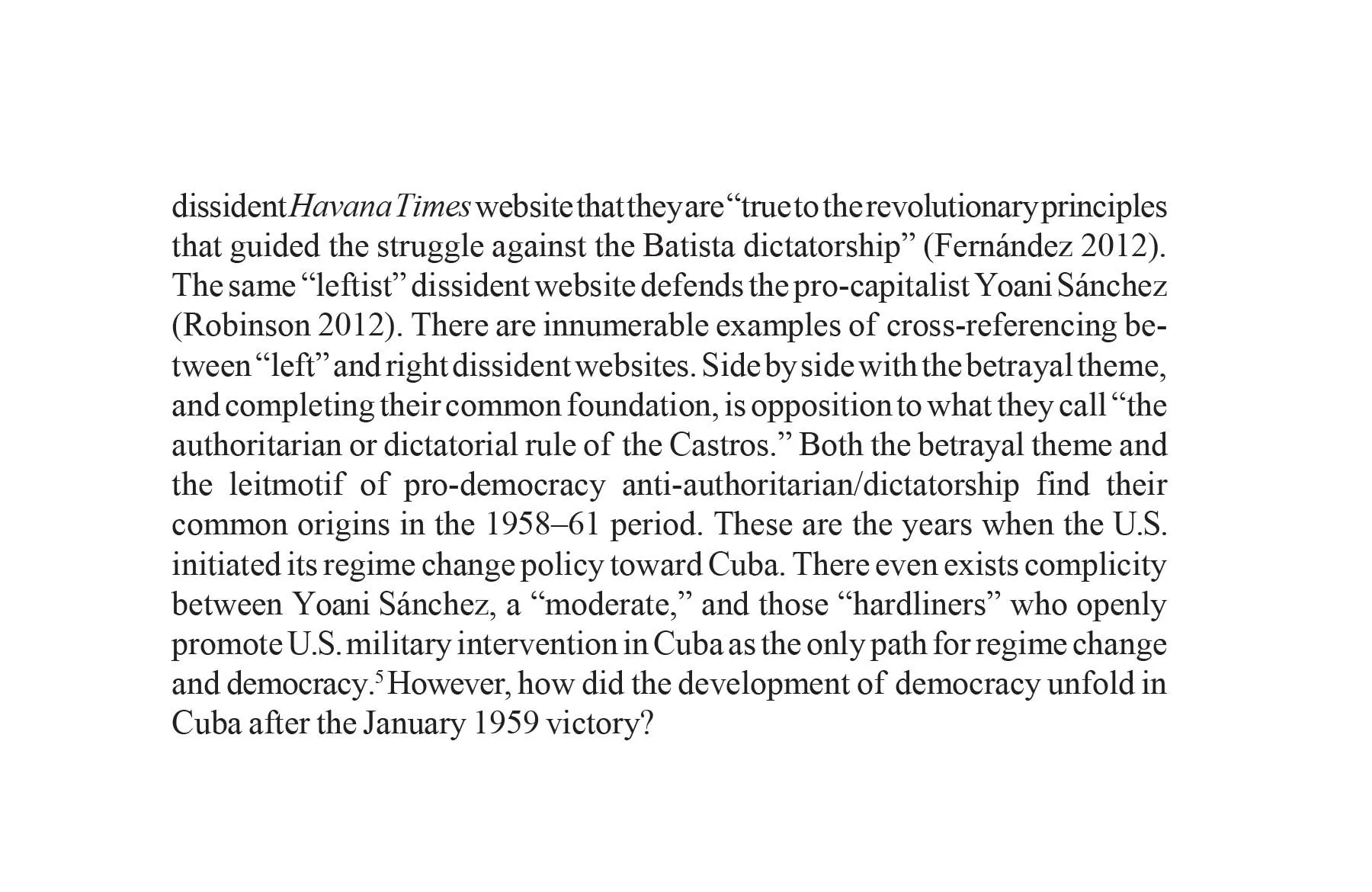
“Prohibiting Free Elections”: Who Would Have Thought?
Let us examine the second point in the MLI article, Fidel “betrayed the ideals of his generation, ultimately prohibiting free elections altogether.” In the following book extract, on three different occasions in 1959, uncensored verbatim accounts of exchanges by Fidel with other officials in the government and grass roots Cubans clearly reveal who are the “culprits” for not holding elections at that time. Was it Fidel? Furthermore, the cause of the ultimate decision on elections is laid out. There is a reason for this accord. What happened to the old multi-party system that existed under Batista? Was there a democratic alternative to conventional elections developing in the 1959-61 period? These issues are also dealt with below:
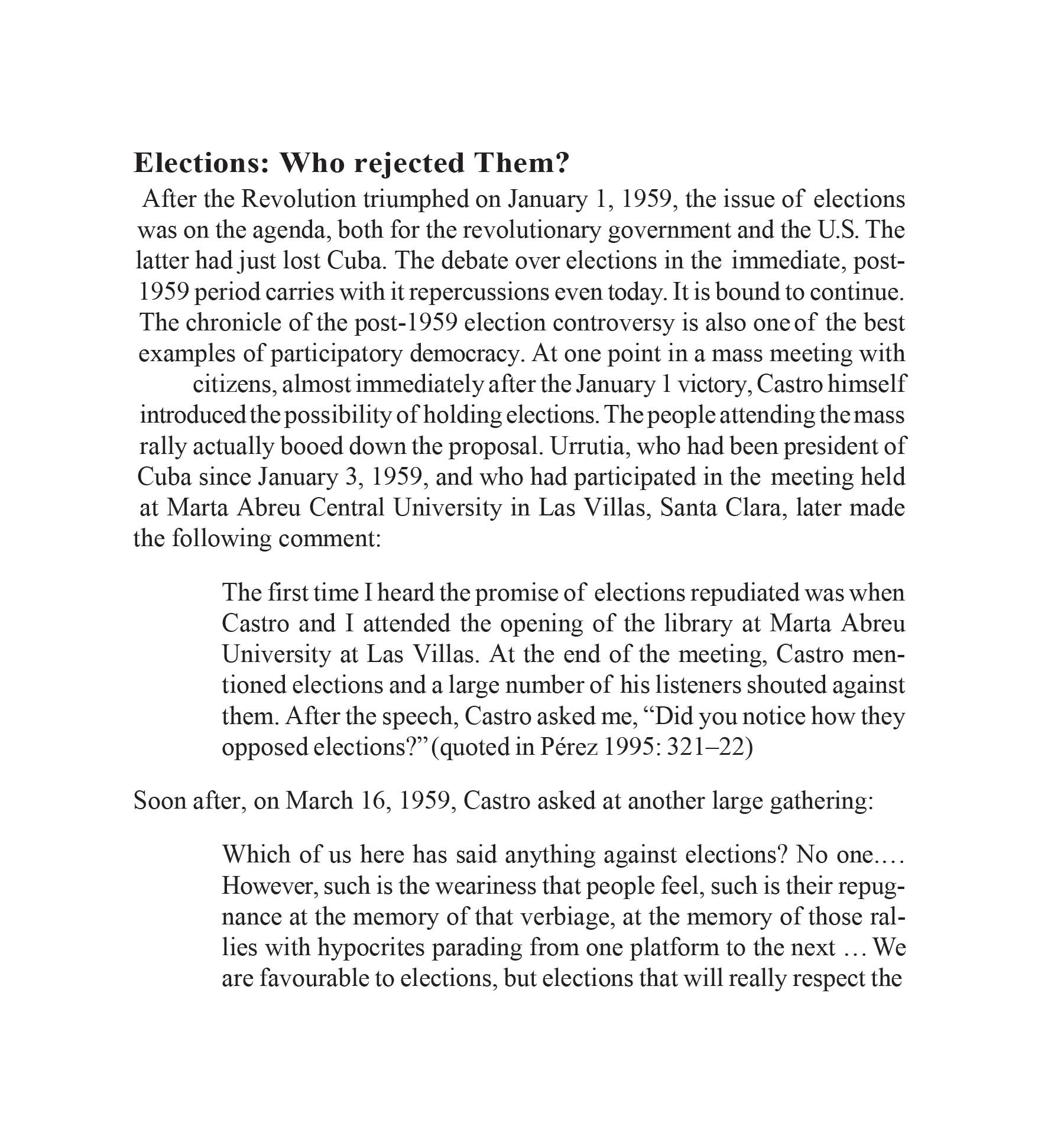
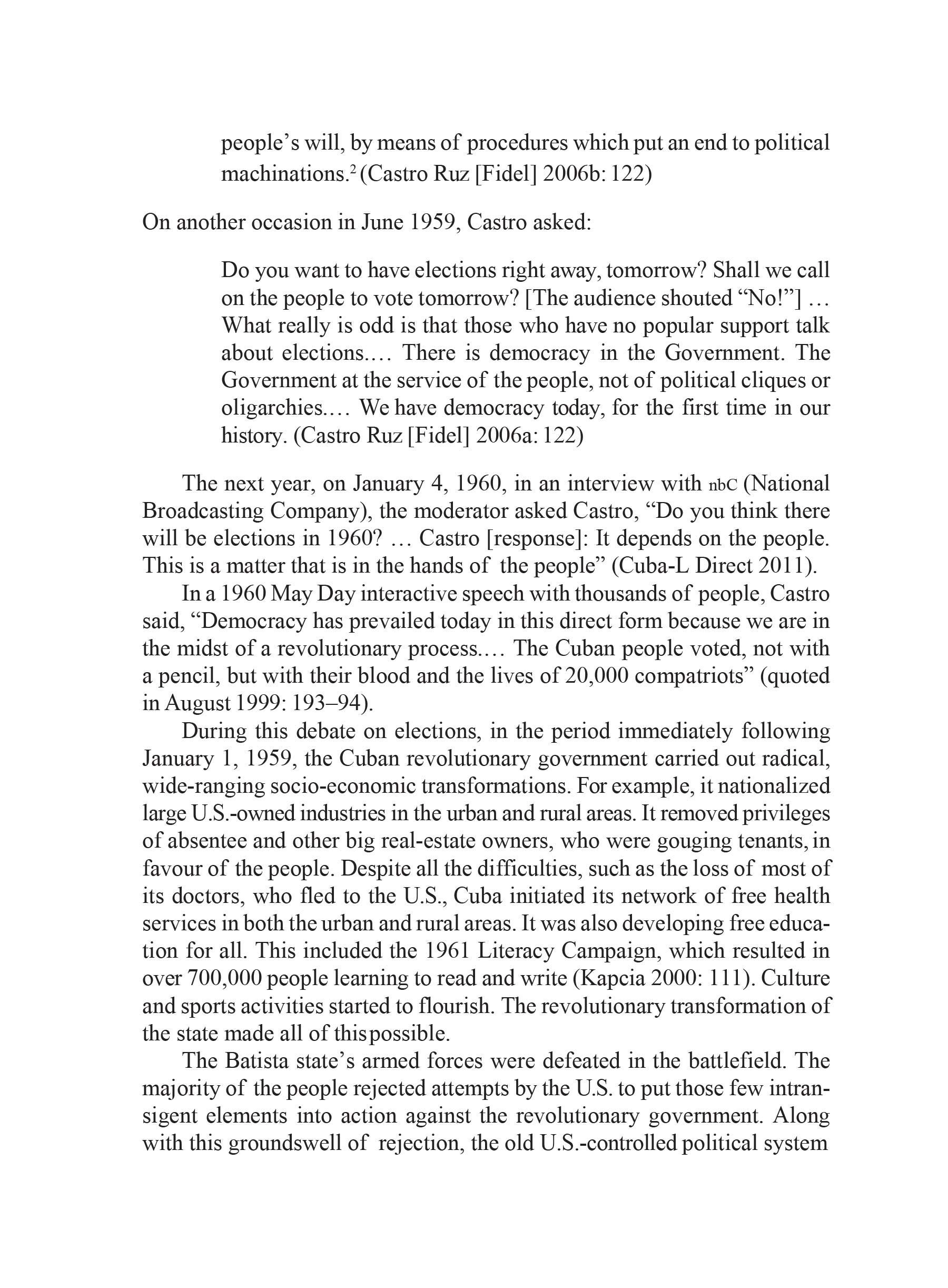
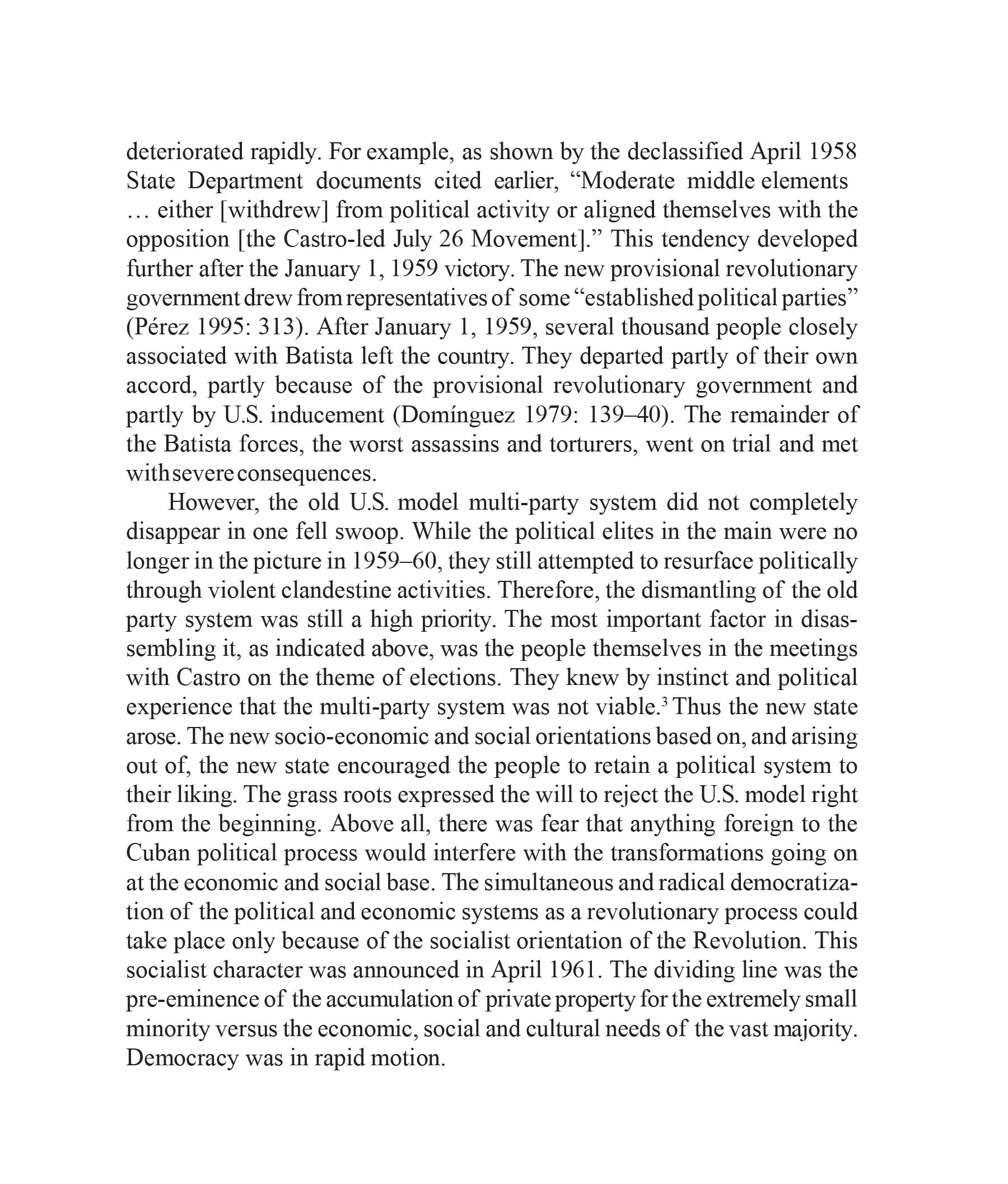
Cuba Without a Viable Constitution?
In the last of the three book extracts on the historical background that says it all for understanding the current situation today, this one concentrates on the MLI article assertion that Fidel reneged on his Constitution pledge: “1940 Constitution—a constitution which his [Fidel] regime had initially promised to restore.” Firstly, one has to take into account, as the initial paragraphs below indicate, that the issue of a constitution and related laws in 1959 took place as a result of a revolution carried out by and for the people. It did not take place in a vacuum. Then, we can see how the two lawyers (Fidel Castro and Manuel Urrutia) who formally headed the new Provisional Government insisted on the legal procedure, including the issue of a constitution.
Did the MLI article lie when it asserts, without any reference, that Fidel abandoned the 1940 constitution. Does the January 4, 1959, decision by the revolutionary government, as cited below, contradict the MLI authors? Readers can reach their own conclusion. Yes, there were indeed changes adopted to that 1940 Constitution. However, what were these amendments, and for what purpose?


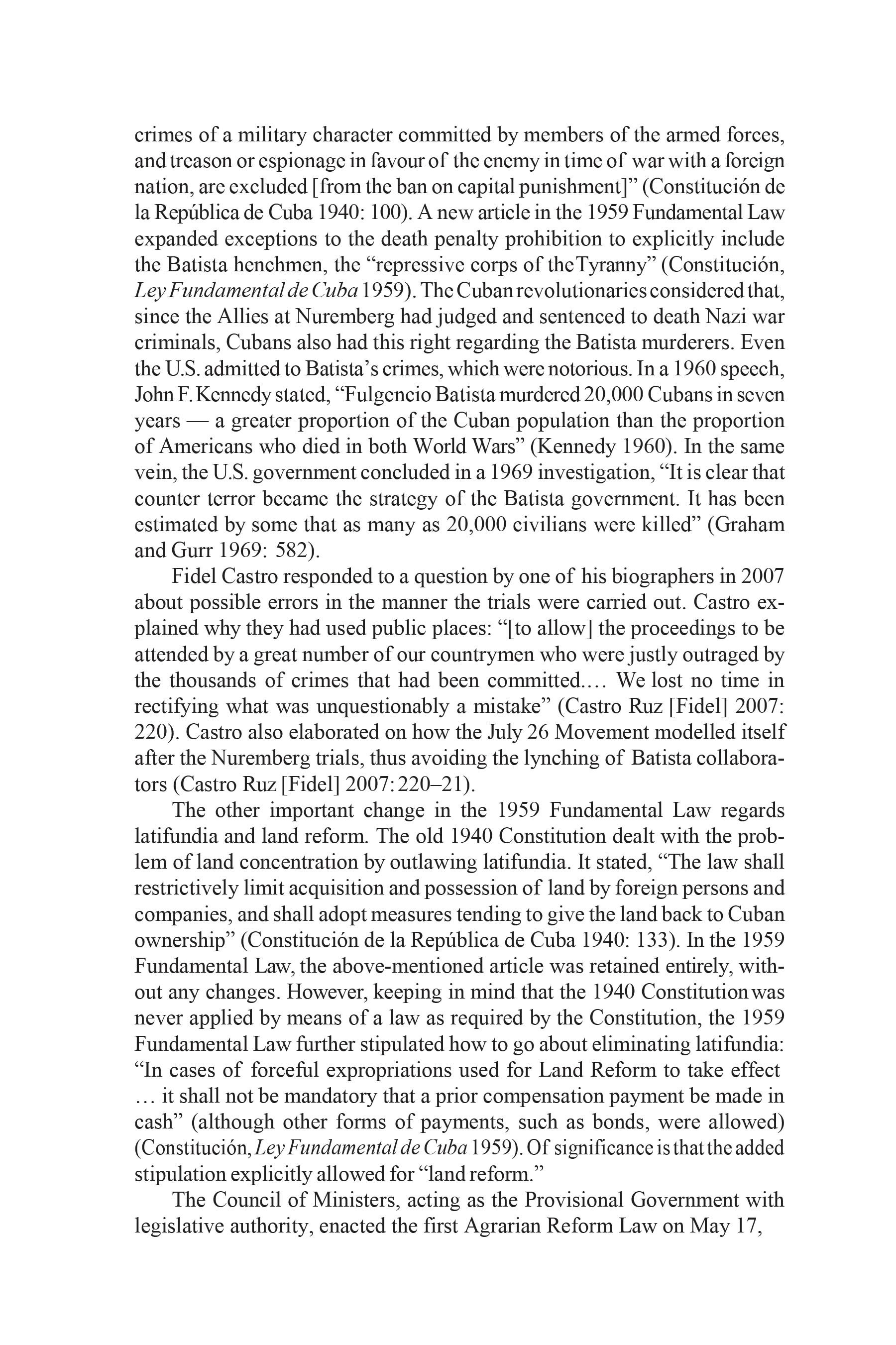
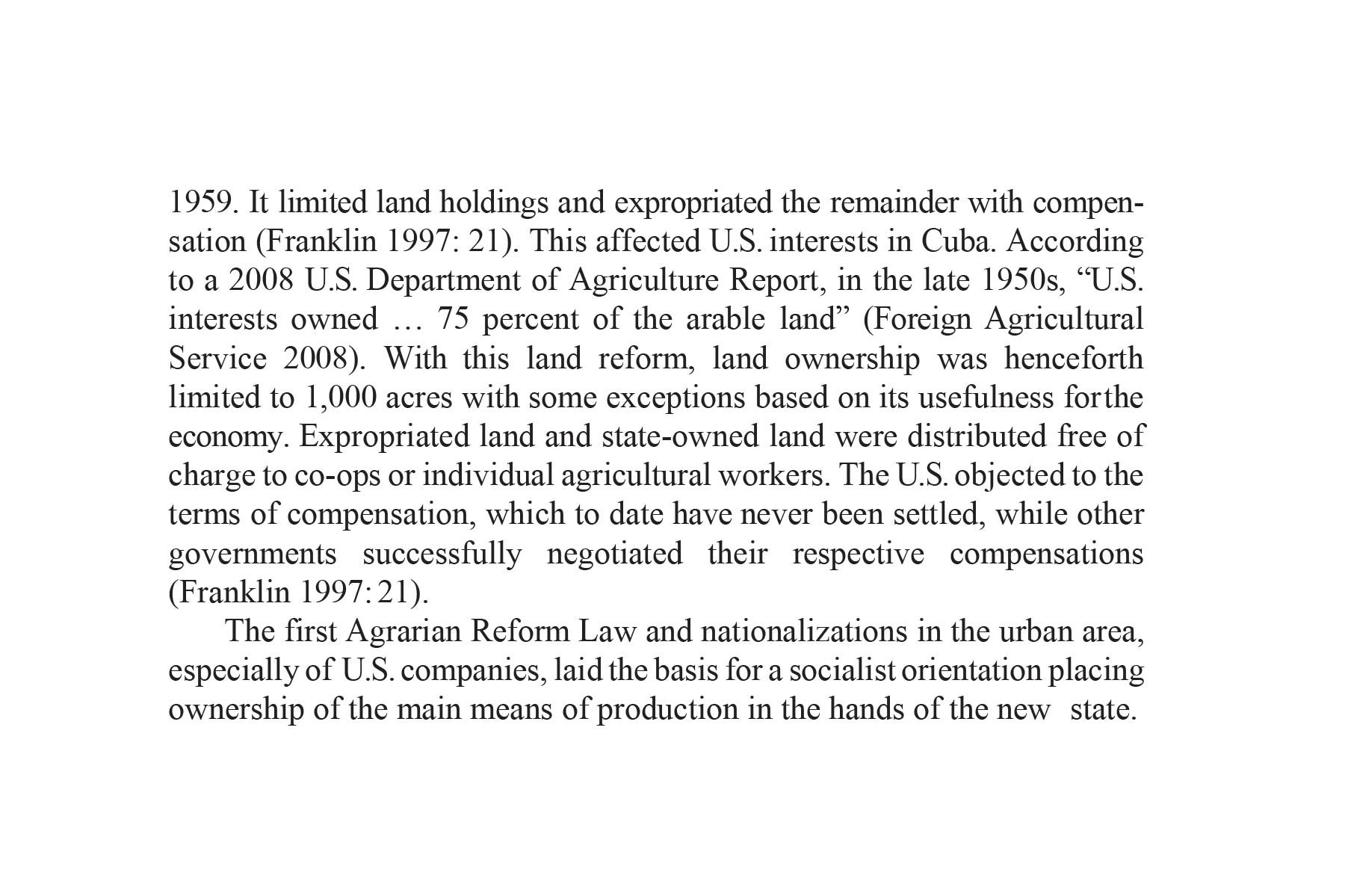
The MLI’s narrative on the Cuban constitution is false. Cuba did in fact adapt a new Constitution in 1976. It was vastly updated in 2019 into a new version, fully discussed at the grass-roots level, and adopted in an open referendum.
Where is the US in the July 11 Protests and Cuban Politics in General?
Now, let us go back to this opening salvo in the MLI article:
The Cuban people’s pursuit of freedom and democracy goes back to at least March 1952, when the country’s constitutional order broke down due to a military coup that ended nearly 12 years of constitutional government.
What is missing in this analysis? The most important point: The US fully supported the Batista coup and his regime that was overthrown by the revolution led by Fidel. This “oversight” is very convenient, because in their analysis of July 11, the authors omit the role of the US in fomenting the violence in the failed attempt at a colour revolution. However, on July 18, 2022, the same MLI authors of the first article cited above, published another one: this one dealing with the US role in Cuba. Nevertheless, rather than encouraging readers to reassess the extremely negative role of the US, the authors double down against any discussion that blames the US as the main culprit through its 60-year-old blockade and the resulting dire economic conditions that certainly played a role in the July 11 protests, while the US converted the legitimate concerns into violent anti-government actions on July 11 and 12.
In the MLI’s July 18 article, entitled “Correcting Canada’s mistaken Cuban narrative, in verbatim US talking points, the authors appeal for the need of
… adjusting how the Cuban story is told in Canada. To this day, the narrative most prevalent in Canada is that the United States’ embargo is responsible for the ongoing poverty and oppression in Cuba. This narrative ignores or minimizes the responsibility of the Cuban regime itself. This view has been driven by the Canadian government’s engagement with the private sector (investors in Cuba) and other such stakeholders in its formulation of its Cuban foreign policy. Notably, this view does not include the perspectives of human rights defenders and members of the peaceful pro-democratic movement in Cuba.
Macdonald-Laurier Institute: A Think Tank that also Promotes Destabilization in Europe, Asia and Russia.
The MLI has a history of promoting regime change and colour revolution narratives based on disinformation. Cuba is the latest in its list of targets, thus not an isolated case. The evidence below regarding Europe, Asia and Russia in addition to the documentation based on their July 11 Cuba article, disqualifies the MLI as an independent non-partisan institute it claims to be.
The MLI first came to The Canada Files’ attention in July 2020, when they called for sanctions against China and Iran, falsely accusing them of “covering up the original outbreak and failing to respond to COVID-19 in time.”
The MLI was developed by Brian Crowley while he was the 2006-07 Clifford Clark Visiting Economist of the then-Conservative Canadian federal government. In 2009, Minister Flaherty hosted a private fundraising dinner at Toronto’s Albany Club for the MLI. In a letter, he urged Bay Street elites to come and support the fledgling right-wing think tank, stating that he was “giving it my personal backing.” Soon afterwards, the Aurea Foundation, funded by Peter Munk, gave $100,000 to assist in starting up the think-tank, as revealed on page 13 of their 2010 annual report.
After adding the Latvian defence ministry as a donor in 2017, the MacDonald Laurier Institute called for Canada to continue supporting the NATO mission in Latvia. A year after the Latvian Defence Ministry began funding the MLI, on June 11, 2018, the Macdonald-Laurier Institute founded the Canada in the Baltics Initiative. This initiative was described as “that aims to explore what NATO could do to better secure its Eastern frontier … from the threat posed by Russia.”
The centerpiece of this original announcement was a 40-page research paper titled “On the Baltic Watch: The Past, Present, and Future of Canada’s Commitment to NATO’s Enhanced Forward Presence in Latvia”.
TCF’s Editor-in-Chief, Aidan Jonah, revealed in the same article that:
“In a particularly eye-opening paragraph [in a 2018 MLI report], the MLI openly brag[ged] about how NATO’s presence forces Russia to spend more on defence, while it suffers under aggressive sanctions, reducing its ability to spending on valuable social programs, or to combat economic inequalities in their society. The MLI hopes that this reduces the Russian government’s legitimacy:
“Sanctions hamper the [Russian] economy “while the security dilemma has Russia spending more on defence, which has a compound deleterious impact on regime’s ability to spend on economic and social issues and thus on its legitimacy in the eyes of a population that bears the brunt of the consequences.” (pg. 20 of the paper)
On May 13, 2019, the MLI hosted Latvia’s Deputy Prime Minister and Minister of Defence, Dr. Artis Pabriks, Janis Karlsberg, the Latvian Undersecretary of State and Policy Director of the Ministry of Defence, and the aforementioned Latvian Ambassador to Canada, Kārlis Eihenbaums, for a round-table discussion on “Russian disinformation activities.. The MLI failed to disclose that the Latvian Defence Ministry is a major donor to the Institute, which is especially noteworthy when promoting an event headlined by the Latvian Minister of Defence. Throughout the next few years, the MLI has continued to put out reports demonizing Russia.
The Taiwan province administration, through the Taipei Economic and Cultural Office (TECO) in Canada (Taiwan’s equivalent of an embassy) began to engage with the Macdonald Laurier Institute in earnest during the 2017 year, being one of the listed event sponsors, in the MLI’s annual report. TECO became a financial donor for the first time during the 2018 year. That same year, the MLI ramped up its anti-China agenda, bringing on multiple anti-China senior fellows such as David Kilgour, along with noted anti-China activist and actress Anastasia Lin joining the MLI as the “MLI ambassador on Canada-China policy.”
The MLI’s coverage of Taiwan increased massively in 2018 (the MLI even called for Canada to loosen “Ottawa’s Rigid ‘One-China’ Policy with Taiwan”), while the first dedicated Taiwan event occurred that year, from absolutely nothing, conveniently after they started getting an undisclosed amount of funding from TECO in Canada.
In 2019, TECO was acknowledged to be the middle organization for the Taiwan Ministry of Foreign Affairs to donate to the MLI. The Taiwan Foundation for Democracy is also listed as an MLI donor. The Taiwan Foundation for Democracy was established in 2003, “with the support of the Ministry of Foreign Affairs and all major political parties.” The Minister of Foreign Affairs serves as the Vice-Chairman of the TFD, so it’s an openly government associated and backed institute.
Michael Cole would join the MLI as a Senior Fellow in April 2019. Cole is a Taiwan-based analyst and anti-China spook, since May 2021 a geopolitical consultant for both the Taiwanese government and the private sector, who before coming to Taiwan in 2005, was an analyst with CSIS in Ottawa.
The MLI also had anti-China former Chief Secretary of Hong Kong SAR, Anson Chan, join as a “distinguished fellow” on August 23, 2019.
On the same day, they had Nathan Law, former co-founder of US puppet regime change party Demosistō, and one of the main Hong Kong rioters before he fled to the West, join them as the MLI’s “Ambassador on Canada-Hong Kong policy.”
Conveniently, the strongest anti-China voices at the MLI joined as senior fellows within two years of TECO in Canada, the unofficial Taiwanese embassy in Canada becoming an MLI donor, and in the same year that the Taiwan Foundation for Democracy became a donor as well.
In September 2020, the MLI launched “DisinfoWatch.org,” an “anti-disinformation” project run by anti-communist MLI senior fellow Marcus Kolga, who defends Estonian Nazi collaborators. The project is funded by the US State Department’s Global Engagement Center and Journalists for Human Rights, along with the MLI. The GEC was described as “an organization created by former US president Barack Obama to counter ‘foreign propaganda.’”
Between 2016 to 2020, Kolga was President Emeritus of the Estonian Central Council in Canada. He was also Vice-President of the Estonian World Council as of 2017 (information on the full timeline which he served as VP for isn’t available).

Both the ECC and EWC never apologized for praising an Estonian government which passed a law in 2012 to hail Estonia’s Waffen SS as “freedom fighters.” Producer of COAT’s magazine Press for Conversion, Richard Sanders explains that:
“The Estonian World Council (EWC) was formed in 1955 by the anti-communist émigré groups that led their ethnonationalist communities in Canada, the US and Sweden. ECC’s early leadership was rife with Nazi collaborators including former officers of Estonia’s Waffen SS.”
In 2019, Kolga was elected as the President of the Central and Eastern European Council in Canada, three of the eight groups which make up the CEE in Canada were early supporters and organizers with Black Ribbon Day (an anti-communist event which equates communism and Nazism), being crucial figures in ensuring the events’ success.
Since its founding in September 2020, Kolga has directed DisinfoWatch.org towards a mix of focuses, mainly debunking COVID conspiracies, “extreme left-wing conspiracies” and targeting “Russian and Chinese disinformation.”
A Globe & Mail article on the initiative openly stated that the website is funded by the U.S. State Department’s Global Engagement Center and Journalists for Human Rights, along with the MLI. The GEC was described as “an organization created by former U.S. president Barack Obama to counter ‘foreign propaganda.’”
The “DisinfoDigest” which gained the Globe & Mail’s attention originally was an analysis of tweets linked to Canadian accounts permanently
DisinfoDigests have claimed that “Canada does not arbitrarily arrest foreign citizens,” and ignored that Huawei CFO Meng Wanzhou’s arrest was based on extremely faulty evidence, which was part of a case based on US sanctions which are illegal under international law. They’ve also smeared the Chinese COVID response and Russian vaccines, while having denied that Western pharmaceutical companies were being protected, by the West’s ignorance of the safety and low cost of both countries’ vaccines. The British medical journal, The Lancet, revealed that Sputnik V vaccine has a 91 per cent effectiveness, and does not cause deaths.
What credibility does the Macdonald-Laurier Institute have in assessing Cuba when its very raison d’être is to act as the Canadian franchise of the White House and US State Department in world affairs?
References
[i] Foreign Relations of the United States, Document 208. 1961. “Memorandum From the President’s Special Assistant (Schlesinger) to the Political Warfare Subcommittee of the Cuban Task Force.” United States Government Printing Office (May 8) (1961–63), Vol. X, Washington. Political Warfare Subcommittee of the Cuban Task Force.” United States Government Printing Office (May 8) (1961–63), Vol. X, Washington.
[ii] Ibid.
[iii] Op. cit., Document 340. 1962. “Memorandum From the Chief of Operations,
Operation Mongoose (Lansdale) to the Special Group (Augmented).”
[iv] Op.cit., Foreign Relations of the United States, Document 208. 1961
[v] Op.cit., Foreign Relations of the United States, Document 208. 1961.
[vi] Document 340. 1962.Op. cit.,
[vii] Kennedy, John F. 1960. “Remarks of Senator John F. Kennedy at Democratic Dinner, Cincinnati, Ohio.“ JFK Library (October 6). At <http://www.jfklibrary.org/Research/Ready-Reference/JFK- Speeches/Remarks-of-Senator-John-F-Kennedy-at-Democratic-Dinner- Cincinnati-Ohio-October-6-1960.aspx>.
[viii] Foreign Relations of the United States, Op. cit., Document 355. 1962.
“Memorandum From the Department of State Operations Officer for Operation Mongoose (Hurwitch) to the Chief of Operations, Operation Mongoose (Lansdale).” (July 19) (1961–63),Washington.

Arnold August is a Canadian journalist and lecturer, the author of Democracy in Cuba and the 1997–98 Elections, Cuba and Its Neighbours: Democracy in Motion and Cuba–U.S. Relations: Obama and Beyond. As a journalist, he collaborates with many websites in Latin America, Europe, North America and the Middle East. He is a contributor to Orinoco Tribune. His website: www.arnoldaugust.com